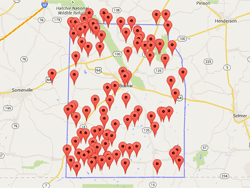On last Saturday night three prisoners, W. H. TODD, W. H. PARKS and H. T. BIRD, made their escape from jail of this county. PARKS, it will be remembered, killed a man named RAINEY, at Saulsbury; BIRD stole a horse from G. T. PATRICK, and TODD figured in the celebrated lock game which transpired at Grand Junction, a few weeks since. Owing to the remarkable manner of escape of the accused trio, we deem it not out-of-place to note the incidents therewith connected, and when it is considered that our jail is one of the best and most secure in the State, it will be seen that almost superhuman exertions were made and a fund of ingenuity brought into requisition.
The men were confined in what is known as the upper cell, or cage, which is about fourteen feet square, the walls of which are composed of solid oak timbers, eight inches square, placed in an upright position, and at intervals of a few inches, strapped with heavy iron bars, which cross and recross each other, so as to form a perfect network. The south and north walls of the cage each have an opening, left for the purpose of admitting light, about four feet high by six inches wide, formed by sawing off one of the uprights, which is narrower than the rest. On either side of the solid timber facing this opening there is a heavy plate of iron, three-quarters of an inch in thickness and fully six inches wide, firmly fastened with counter-sunk bolts, and all secured with heavy iron cletes, at once presenting an impassable barrier save to the most accomplished and ingenious knave.
This iron coop, so to speak, is situated in the centre of the upper room. There is a passage way about four feet wide between it and the main walls of the building and a north and south window, barred with substantial solid wrought iron rods. After maturing their plans, the prisoners set to work. BIRD was chained to a bolt in the center of the prison, but the chain was long enough to enable him to reach any part of the floor. A hoop was taken off one of the buckets usually placed in the room at night; a three-cornered file was found hid away in a crack, and with this they made a small saw of the hoop.
The place selected for their secret work was one admirably suited to the occasion. Eighteen inches below the ceiling of the cage, and just above one of the heavy iron bands that held the solid plate to the upright facing the aperture, for night and day they busily applied the little file, first cutting the iron facing six inches wide, then the bolts, and then the eight inch timber. Lastly, about one foot of the iron band, or clete, was cut off, with which the iron plate was wrenched from its place, the upper part of the upright taken out and a hole formed of sufficient size to admit their passage.
Having reached the space between the outer wall of the cage and the main walls of the room, they worked rapidly and cautiously at the yielding bricks and mortar beneath the windowsill. After picking a hole large enough to pass through, they took the chain which embellished the leg of BIRD, wrapped it with strips torn from a woolen blanket, fastened it to the bars above; to the chain they attached their blankets, and with ease and safety lowered themselves to the coveted ground below. Of course they never stopped to make a geological examination of that particular spot, but made all haste to safer quarters.
From pretty good information, we are led to believe that they made their escape from jail before eleven o’clock, as three men got upon the northward bound 11:30 train the same night, and in such a manner as to lead one to believe that all was not right. They paid their fair after the train was in motion, and are, no doubt, many miles from this place today.
Before leaving a letter was written to the jailer, and which, for the sake of novelty, we print below. It was evidently written by TODD. We hope he will excuse us for correcting bad spelling, and pardon us if we suggest that he should devote must of his time to Webster’s smallest sized words. Here is the letter.
March the __, 1867.
To the Jailer, Mr. H. T. PUNCH;
In many the last hours, we, William H. TODD and W. H. PARKS, and H. T. BIRD, have to leave our kind respects to you and family, for we, as prisoners, left in your charge, owe you all our kindest wishes for your kindness towards us while we boarded with you. I have no doubt but what this letter will take you on surprise, but nevertheless there has as strange things as this happened before. For days and nights we have labored hard, and very hard, to accomplish our feat, to gain our liberty. We have finally succeeded.
Now you can have all the particulars in regard to our escape. We are under no obligations to neither man or woman for any favors shown us for escape. We used the hoops off our water bucket for a saw, and the file was found in a crack in the wall. We made handles for them and set to work like tigers. We laid our plans and they came out victorious. Now we will try for our escape; everything is quiet now, and every one in bed asleep. It is a little after three o’clock.
The man who found some other man’s horse is to take the lead. He says he knows every pig path through the country. We expect to be pursued, but we trust we will not get far before we get friends and horses. We have four wide roads to take our choice of, that is east, and west, and north and south. I don’t think that we can take them all! but we will pick the one we think best for all. I don’t like to leave. If I could get bail I would not leave, for I am not guilty of no crime, and I know I will have to stay here till my trial. I will take this trip and see if I can’t make some money and fee my lawyers and I will come back on my own responsibility.
Signed W. H. TODD
With these few lines I hope I do not leave no enemies. You shall hear from me soon.
Yours as ever,
W. H. TODD
W. H. PARKS
H. T. BIRD
It is proper to state that TODD says he is a Cincinnati-an, while BIRD claims to be from Louisville. PARKS is the same person who, some time ago, ran off and left his bondsmen “with the bag to hold,” and was arrested in southern Illinois, a few weeks since, by our fellow citizen, John B. RUFFIN. It is the general impression that BIRD is the shrewdest of the trio, and a very hard bird to keep caged. The refugees have, doubtless, returned to their familiar haunts.
The Bolivar bulletin. (Bolivar, Hardeman County, Tenn.), 30 March 1867, Page 2. Chronicling America: Historic American Newspapers. Lib. of Congress.




